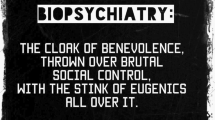Conclusion
Neither absolute doubting of the validity of what others say, nor absolute acceptance, are healthy ways of using the intellect. In both instances real thinking is avoided and self-idealization increased. Unfettered thought, with real courage to make efforts at understanding, could express an ideal for analytic work as well as for living and growing. This is one of the freedoms an individual accords to himself and others, in the search for truth.
Similar content being viewed by others
Additional information
Read before the Association for the Advancement of Psychoanalysis at the New York Academy of Medicine, November 22, 1950.
B.A., Cornell, 1927; M.D., Woman's Medical College of Pennsylvania, 1935; Lecturer, American Institute for Psychoanalysis and New School for Social Research; Fellow, American Psychiatric Association; Practicing psychoanalyst.
Rights and permissions
About this article
Cite this article
Van Bark, B.S. Smartness and stupidity in neurosis. Am J Psychoanal 11, 36–41 (1951). https://doi.org/10.1007/BF01872803
Issue Date:
DOI: https://doi.org/10.1007/BF01872803




